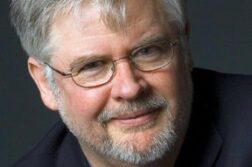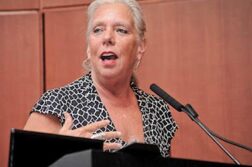As is our annual custom at year’s end, we bring to mind some of the prominent GLBT writers, artists, and activists that died over the past year.
Ai (née Florence Anthony), widely anthologized Guggenheim-winning poet, died on March 20 at age 62, of complications from cancer, in Stillwater, Oklahoma. Though most obituaries did not mention it, her lesbianism is quite well-established (see, e.g., Pridesource.com). Among her seven collections of poetry were National Book Award winner Vice (1999) and American Book Award winner Sin (1986). Ai (which means “love” in Japanese) described herself as “1/2 Japanese, 1/8 Choctaw, 1/4 Black, and 1/16 Irish.” Born in Albany, Texas, Ai received an MFA from the University of California-Irvine and at the time of her death was a professor in the creative writing program at Oklahoma State. A posthumous collection, No Surrender, was published by Norton in September.
Rane Arroyo, a Pushcart Poetry prize winner, died on May 7 at age 55, of a cerebral hemorrhage following a fall. Winner of the Sandburg and Ciardi prizes, Arroyo was the author of plays, short stories, and over a dozen books and chapbooks of poetry, the most recent of which was White as Silver (Červená Barva Press, 2010). Professor of English at the University of Toledo (Ohio), where he was recently selected as a Distinguished University Professor, Arroyo is survived by his life partner of 28 years, Glenn Sheldon, also a UT professor, with whom he ran New Sins Press.
Robert E. Carter, one of the first Roman Catholic priests to come out, died on February 22 at age 82, in the Bronx. A founder, in 1973, of what is now known as the National Gay and Lesbian Task Force, he was not disciplined by the church at that time. He was also a co-founder of the New York chapter of the gay support group, Dignity USA, and by the mid-1980’s was supervisor of the outpatient AIDS program at Bellevue. While a student at the University of Chicago, he read James Joyce’s Portrait of the Artist as a Young Man, which convinced him of “the centrality of Catholicism in the history of Western civilization,” and he converted from his Protestant faith. He received a doctorate in classics from Chicago and a master’s in social work from Columbia. He is the author of an unpublished memoir, and is survived by a sister.
John Embry, founder and editor of Drummer magazine, died on September 16 at age 83, at his San Francisco home. Born in Winslow, Arizona, he moved to L.A. at age 18 to attend art school. After Army service, he worked in advertising around the country, and was president of the Homophile Effort for Legal Protection in LA. He founded Drummer in 1976, using Grove Press’s Evergreen Review as his model. The magazine, which contained both serious articles and erotic art and photographs, was pitched to—and helped to create—an international gay leather community. Contributors included such well-known writers as John Preston, Jack Fritscher, and Samuel Steward. Embry sold Drummer in 1986. He is survived by Jerry Lasley, his business partner, whom he had married.
Keith Fleming, memoirist and nephew of Edmund White, died by his own hand at age 49, on April 19, in Providence, Rhode Island. Raised in part by his uncle, his upbringing was recounted in The Boy with the Thorn in His Side (2000). Fleming’s Original Youth: The Real Story of Edmund White’s Boyhood was published in 2003. According to a recent interview with White, there’s talk of making a movie version of this book. Earlier in his career, Fleming was on the staff of the New York Review of Books. He is survived byhis partner, Maria Tulokas, and his biological relatives.
Peter Flinsch, who died at 89 in Montreal on March 30, is remembered in an article by Matthew Hays in the November-December, 2010, issue of this magazine.
Judy Freespirit (née Judy Berkowitz), activist and coauthor of The Fat Liberation Manifesto, died at 74 in San Francisco on September 10. Now widely available via the internet, the Manifesto was originally published in 1973, and closed with the words: “Fat people of the world, unite! You have nothing to lose….” Born in Detroit, she received a master’s in psychology from Pepperdine University, married, and became active in a variety of civil rights movements, including women’s liberation and lesbian activism. Her papers are housed at the June Mazer Lesbian Archives in West Hollywood.
Jill Johnston, cultural critic, writer, and lesbian feminist activist, died at age 81, on September 18, of a stroke. She is remembered in a separate piece, by Esther Newton, in this issue of the GLReview.
Edwin Morgan, national poet of Scotland, died on August 19 at age 90, of pneumonia. A Glasgow-born professor at Glasgow University, his last book of poetry, Dreams and Other Nightmares: New and Uncollected Poems 1954-2009, was published in 2010. His obituary in The Guardian online noted that his poem, “The Death of Marilyn Monroe” “goes forward in lumbering cadences like a funeral cortege led by a Scottish Allen Ginsberg.” He came out as gay only in 1990 at the age of seventy. He received many important national prizes for poetry and was appointed to the Order of the British Empire in 1982. His partner of sixteen years, about whom he wrote several poems, died in 1978.
Peter Orlovsky, a beat poet best known as the muse of Allen Ginsberg, died on May 30 at age 76, near his home in St. Johnsbury, Vermont, of lung cancer. A model for painter Robert LaVigne, he happened to be in LaVigne’s studio when Ginsberg dropped by. Orlovsky and Ginsberg considered themselves married, though Orlovsky had girlfriends during their relationship, and Ginsberg had many other sexual encounters. Orlovsky appeared twice in Jack Kerouac’s novels: as George in Dharma Bums (1958) and as Simon Darlovsky in Desolation Angels (1965). He was portrayed by Aaron Tveit in 2010’s Howl. Encouraged early on by Ginsberg, Orlovsky’s poetry has been described as “earthy” and “Whitmanesque.”
John Stahle, founder and editor of New York-based Gany-mede magazine, died in April. Ganymede, a high-quality gay literary magazine, published the established (David Leavitt, Alan Bennett), the unexpected (early 20th-century feminist Susan Glaspell), and upcoming writers, as well as photographers and poets. Educated at Fordham, Stahle wrote under his own name (in Ganymede) and as Julian Grenfell, the name of a British poet killed in World War I. Seven issues, as well as Ganymede Unfinished, a tribute issue, are available on-line.
David Vilaseca, an expert in Hispanic culture, died at age 46 of injuries following a bicycle accident in London, on February 9. A native of Barcelona, he lived in London as an openly gay man. He received his doctorate from University of London, where he became professor of Hispanic studies and critical theory in 2003. He wrote several scholarly books and dozens of articles, many of which focused on gay Spanish writers. His autobiographical novel, L’aprenentatge de la soledat (2008), won a major prize for Catalan fiction.
Donald Windham, novelist and memoirist, died on May 31 at age 89, in Manhattan. Arriving in New York on a bus from Atlanta at the age of nineteen, he quickly became friends with some of the most famous names in the world of art, literature, and theatre, among them Lincoln Kirstein, who hired him to edit his magazine Dance Index. He collaborated with Tennessee Willliams on You Touched Me, which had 109 Broadway performances in 1945-46. His fiction, in which homosexuality was usually a subtext, received a better reception in Europe than in the U.S. His life-long partner, Sandy Montgomery Campbell, whose Stamperia Valdonega in Verona, Italy, published many first editions of Windham’s works, died in 1988.
Wayne Winterrowd, gardener and writer, died of heart failure on September 17 at age 68, at his home in Readsboro, Vermont. He grew up in Shreveport, Louisiana, and began gardening at the age of three. He received his bachelor’s and master’s degrees at Louisiana State University, where he completed coursework for a doctorate in Jacobean literature. While teaching at Tufts University, he met Joe Eck at Sporters, a gay bar in Boston, in 1969. Seeking a place to settle, the couple, who later married, ended up in Readsboro in the mid-1970’s, where they began writing about horticulture, and wrote the first of four co-authored books, A Year at North Hill: Four Seasons of a Vermont Garden (1995).
Robin Wood, film critic and expert on Alfred Hitchcock, died of leukemia on December 18, 2009, in Toronto, at age 78. Born and educated in England, where he received a degree in English from Jesus College, Cambridge, he taught in Canada for many years. The first of his many books—virtually the first serious book in English about a film director—was Hitchcock’s Films (1965). In 1977, he delivered a speech to the British Film Institute, “Responsibility of a Gay Film Critic,” having come out several years previously. In 1985, he and his longtime partner Richard Lippe started publishing CineAction, an academic journal. Issue 80 was published earlier this year. He is survived by Lippe, as well as children and grandchildren.
Sources Consulted: Gay and Lesbian Literary Heritage (1995); and the websites advocate.com, bbc.co.uk, bryanborland.com, cervenabarvapress.com, ebar.com, jweekly.com, lgbtpov.com, magazine.uchicago.edu, matthewhittinger.com, english.okstate.edu, guardian.co.uk, rememberingjohnstahle.com, lambdaliterary.org, living.scotsman.com, nytimes.com, pridesource.com, utnews.utoledo.edu.




